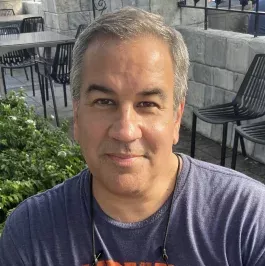Posted On: April 4, 2023
SMC vice president and CFO Stephen “Jan” Grigsby, FHFMA, MHA, is one of those rare senior finance executives who came to his position from a clinical background.
And as his experience shows, such finance leaders are likely to have valuable lessons and perspectives to share with their peers who have come up through the more usual channels (e.g., from positions as CPAs in auditing and consulting firms, as Medicare cost reporting auditors through their fiscal intermediaries or as graduates of MBA or MHA programs). In Grigsby’s case, having a clinical background has helped to inform his financial perspective.
Grigsby, a 27-year HFMA member, became SMC’s CFO in 2012. Since then, he has seen the private, for-profit, 270-bed, family-owned hospital grow significantly, in part due to the role he has played in helping to improve the hospital’s financial condition.
His healthcare career has spanned 37 years -- the last 27-years as a CFO at a variety of hospitals.
“I have been at small and large nonprofit hospitals, a safety net hospital, large for-profit chain community hospitals and, now, a family-owned private hospital,” Grigsby said. “It has given me a richer and broader perspective on our industry.”
Grigsby’s unique perspective derives from a diverse range of clinical roles he played during the first nine years of his career in healthcare. During that time, he performed important, highly technical work as a telemetry technician, unit secretary, physical therapy technician, cardiovascular technician and auto-transfusionist.
He is particularly effusive regarding his time as a unit secretary.
“You quickly learn all corners of the hospital,” he said. “To do what is right and expedient for the patient, the unit secretary must speak to everybody. They are very much like an air traffic controller. Communicating with the physicians, nurses, dietary workers, materials management professionals, physical therapists, etc., was essential and extremely educational regarding how the hospital operates.”
Drawing on the knowledge he gained from deep interactions between the clinical and financial sides of operations, Grigsby has achieved many financial improvements in his hospitals. Examples include systematically improving operating margins and significantly reducing accounts receivable days using a cross-disciplinary approach. He also has led a cardiology service line initiative to build a structural heart program in partnership with the region’s largest cardiology practice, increasing program profitability over the period of 2016 through 2022. In particular, his background in cardiology was instrumental in communicating and building support with the heart program’s physicians.
“Over all the years and facilities with which I have been involved, having implemented or utilized so many financial, budgeting and costing systems, as well as electronic medical records systems, I’ve learned to quickly and effectively use them to help the hospital achieve established goals,” Grigsby said. “This has helped us to get the most out of whatever systems we have on board at the time.”
Grigsby has an overarching theme and thesis for his work, which he summarized saying, “We constantly need to ask, ‘Are we doing good for our community and really serving the customers who are coming through the facility front door, through the ER or through the physician office?’ And we need to ask that question because making it easier for the patients and their families is what it is all about.”
He also stressed that making things easier for patients is good for the hospital and its bottom line.
To achieve that purpose at SMC, Grigsby helped to implement an approach he calls a “bed-huddle model.” The model involves a multispecialty group that meets routinely to discuss patients who are having issues that are impeding better care. The group includes case managers, social workers, nurses, nurse extenders and others to discuss specific breakdowns impacting efficient and effective care. This approach has helped to significantly decrease patient length of stay — including through better patient flow — while improving patient satisfaction scores, FTEs per average occupied bed and labor productivity.
“This has been a win-win for the patients and the hospital,” Grigsby said.
Grigsby’s favorite overall memories of HFMA are of those collective friendships made, and the many lasting partnerships created over the years with HFMA-affiliated vendors, which he said have allowed him to help his organizations create growth and improve financial outcomes.
Many of these friends and partners also have been a source of inspiration for Grigsby.
“I am so grateful for my path in healthcare,” he said. “I am humbled everyday by the dedication, passion, and intelligence of those who have given so much to their communities, so much to their profession, and have stood as amazing examples for my own career.”
Grigsby has the following words of advice for his peers, which reflect the principles that have guided his journey from the clinical side to the financial side in healthcare.
1. The most important part of communication is listening. Listen to your customer, to your community, to those who report to you, and to those whom you report. Never try to prove you are the smartest person in the room; you will usually be mistaken.
2. Provide direct reports with the technology, the tools, and the necessary policies or guidelines to help them create strategies. Then get out of their way. Let your reports grow and show what they can do, how they can develop and thrive. Micro-management has never worked during my career path.
3. Keep a steady balance and temperament for the organization. Whether in good times or bad times, the CFO should not be too high or too low when it comes to financial or operational outcomes in healthcare.
4. Remember: Quality drives the bottom-line, not the other way around. This is a determination I have always carried with me since I began my career on the clinical side of healthcare many years ago.
5. Respect and celebrate culture within an organization as a vital component of financial success and quality outcomes. This is a principle I have grown to embrace over the years.
Link to online article: https://www.hfma.org/leadership/a-clinical-background-can-give-a-hospital-cfo-greater-financial-acumen/
